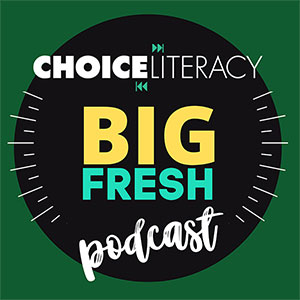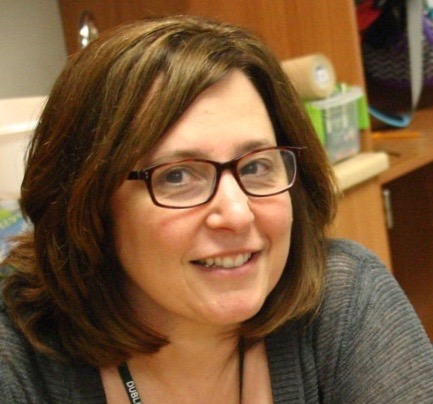In this podcast, Franki Sibberson chats with Donalyn Miller about how she defines “engaged” reading, and the teacher’s role in motivating readers.
A full transcript of the podcast is available below the player.

Franki Sibberson: Hi Donalyn. Can you tell us how you define student engagement and how you know if students are engaged readers?
Donalyn Miller: Well, I think student engagement is, are kids into school? Are they enthusiastic about learning? Are they with you when you’re teaching? Do they come into school excited about being there? Are they checked in to the learning? So that’s how I would define engagement for them. How do I know kids are engaged readers? Well, when I look across my classroom and I don’t hear anything, and all I see are bowed heads and children reading, and I know that they’re reading every day – when they come into school at the beginning of the day and rush up to me to talk to me about the books that they’re reading.
Like this morning. Two girls ran up to me. “Ms. Miller, did you know that Rick Riordan’s new book, The Lost Hero, you can read the first two chapters online for free? And we went online and we read it. Did we order that book? Are we going to get it when it comes out?” I mean, anticipating books, being excited about books, sharing books with their friends, and just that joy that they have in reading and following their series that they love – that’s when I know that they’re engaged.
Franki: Right. So how do you support that in your teaching, then? I think some kids come in engaged before they get there, probably. Some kids it’s a little more challenging. How do you give them time or help them become engaged if they’re not engaged readers to begin with?
Donalyn: Well, I think at the beginning of the year what I really focus on is trying to meet with every child on a one-on-one basis, and it takes a long time but it’s important to me. One, because I think some children, they’re not seen during the school day. They’re the quiet children who just do their job, they don’t say a lot in school. They’re not on anybody’s radar for any reason, and they also are maybe not the biggest participators in the class. So even sitting down with them and having a ten-minute conference with them really provides teachers some insight into that child.
But I also work diligently to help them find that book. If they’re not engaged readers already, I’m convinced it’s because they just haven’t met the right book yet, for them. And so there’s some fits and starts, but today I have a student who, he spent three weeks reading his first book, and I thought, “Oh dear, he’s not really into it.” He didn’t pick the book himself; a friend recommended it, and I thought he was just a very passive reader, he wasn’t reading his book a lot at home. As I had just finished Michael Grant’s new book, The Magnificent 12, and something about reading that book made me think that this boy would like it, because it does have some action, it’s a pretty easy read for a sixth grader, and it does have some of that gross humor that boys seem to like. But handing him that book this morning and saying, “I thought about you when I finished this. I just knew you would like it.”
And he came up to me at the end of school today and he had already read 30 pages, which was huge for him. That was huge for him. Now, granted I still the book is a little easy for him, but he was into it and I thought, “Okay, that’s one. Now I’m going to have to think about what he’s going to read next, when he finishes that one.” But that feeling – I want kids to have that feeling that they enjoy books and that they can be successful. If they can get that a few times, then I think that road to engagement is easier for them.
Franki: Okay. So when you think about your biggest challenge and kids like that, obstacles, decisions, becoming engaged readers, what I think you’re saying is that you’re just kind of reading books that you think will hook them, and after you’ve done that a couple times, it’s less challenging?
Donalyn: It’s less challenging for the child. Well, first off, the children don’t know me that well, and so I say, “Read,” and they say, “Okay. She’s going to make us read Bud, Not Buddy again,” which they liked but still. . .it’s a great book but they want to see what I’m all about. So when I am willing to come up and read a book and make recommendations to them, once they’ve read a few books that I’ve given them, that they’ve enjoyed, then they’re more willing to take my suggestions, and then I use that relationship to move them into harder books, to move them into things that might stretch them a little bit more as readers. They’re more willing to go with me on the journey after they’ve had a few successes and they trust me.
Franki: And so what do you think stands in the way to some kids not becoming engaged readers? Is it just not having found a book they love?
Donalyn: Well, with some they have real problems in mastering the skills that they need to read well, and we can’t ignore that. For some children, reading is just a challenge because they have learning challenges that make it difficult for them. And so I think as professionals, that’s where we come in and use our expertise to help that child remediate in whatever reading difficulties they might have.
But that’s not the largest group of kids that I see in my classroom. Really, it’s kids that are what I call “dormant readers,” they have the tools that they need to read; it doesn’t have any personal interest to them, and reading is something you do for school, it’s a school job, and why would anybody read in their free time? You know, that just baffles them. So with those children, I think it’s just leading them to great books, and showing them, “Hey, all those things I like in movies and video games, the excitement, the action, the great characters that I follow on my TV shows, I can find those in books, too.”
Franki: Okay. So do you find that once kids are engaged in school, that transfers outside of school?
Donalyn: The easy answer would be yes. I think children that read, kids that are hooked on their books at school are more likely to read them at home. We know that. And it’s like that with us as adult readers. If we’re into a really great book, then we want to be reading it whenever we have the time to read it.
Franki: Right. Okay. Do you think being an engaged reader is enough for our kids today? Is being engaged, does that kind of take care of everything else that they need, or do you think it’s more than that?
Donalyn: Well, I think with learning in general, if we don’t have engagement we don’t have learning. I want them to be excited about reading because of the joy that it brings them, but they’re more willing to participate in academic reading and some of the more skills-based things that we might do in the class because they find reading meaningful, they want to improve. What we know about motivation theory is that without engagement they’re just not learning anything. And so if they’re excited about reading in general, I think it’s easier for them to tackle some of the reading things that they need to learn in school.




